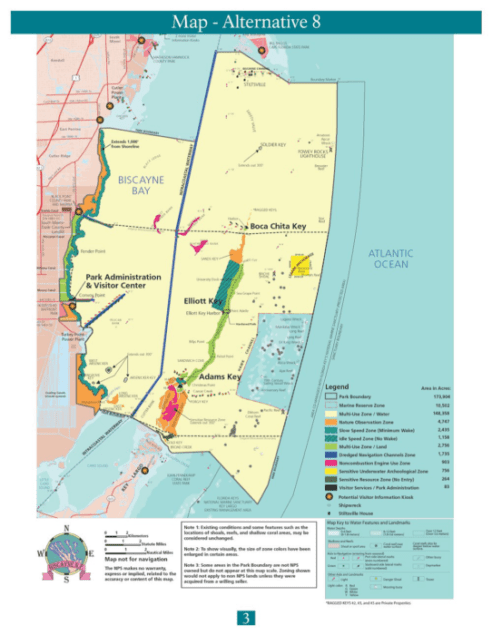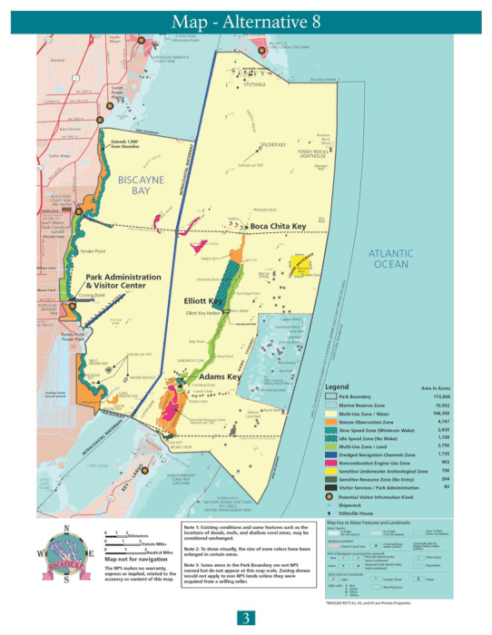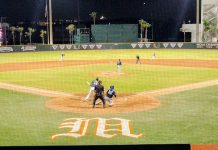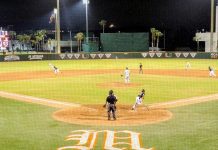 It is science versus politics and the loser could be the unique marine environment of Biscayne National Park (BNP). The situation in BNP has reached a critical stage. According to the U.S. Department of the Interior, BNP has only 5-7% live coral cover and studies show that nearly 80% of the fish species are overfished thereby threatening the future ecological balance of the remaining reefs. Based on this recognized perilous situation, the National Park Service (NPS) recently recommended the creation of a 10,500 acre marine reserve within the park similar to the one created some years ago in the Dry Tortugas. The creation of the marine reserve was one of several recommendations in the NPS’s recently completed General Management Plan which was the result of 15 years of studies, analysis, public hearings, and over 43,000 pieces of correspondence related to the process of which nearly 90% were in favor of protecting the coral reef. The area set aside for the reserve represents only 6% of the entire park and just 30% of the hard bottom reef area. Given the dire condition of the entire reef habitat, the prohibition of fishing within the proposed reserve is the most appropriate and the only workable measure to help the reef habitat recover. Diving, kayaking and boating in general will still be permitted in the reserve and fishing in the other 94% of the BNP will not be affected. The experience in the Dry Tortugas has shown the dramatic positive impact a marine reserve can have on the coral and fish populations. And most importantly, fisherman have enjoyed a significant improvement in catches in the areas surrounding the reserve where fishing is allowed. This is a win for everyone involved.
It is science versus politics and the loser could be the unique marine environment of Biscayne National Park (BNP). The situation in BNP has reached a critical stage. According to the U.S. Department of the Interior, BNP has only 5-7% live coral cover and studies show that nearly 80% of the fish species are overfished thereby threatening the future ecological balance of the remaining reefs. Based on this recognized perilous situation, the National Park Service (NPS) recently recommended the creation of a 10,500 acre marine reserve within the park similar to the one created some years ago in the Dry Tortugas. The creation of the marine reserve was one of several recommendations in the NPS’s recently completed General Management Plan which was the result of 15 years of studies, analysis, public hearings, and over 43,000 pieces of correspondence related to the process of which nearly 90% were in favor of protecting the coral reef. The area set aside for the reserve represents only 6% of the entire park and just 30% of the hard bottom reef area. Given the dire condition of the entire reef habitat, the prohibition of fishing within the proposed reserve is the most appropriate and the only workable measure to help the reef habitat recover. Diving, kayaking and boating in general will still be permitted in the reserve and fishing in the other 94% of the BNP will not be affected. The experience in the Dry Tortugas has shown the dramatic positive impact a marine reserve can have on the coral and fish populations. And most importantly, fisherman have enjoyed a significant improvement in catches in the areas surrounding the reserve where fishing is allowed. This is a win for everyone involved.
 Unfortunately, some groups have refused to believe the science and have pressured Congress to overrule the NPS recommendations. Congresswoman Ros-Lehtinen and Congressman Carlos Curbelo have sponsored the euphemistically challenged Preserving Public Access to Public Waters Act and Senators Rubio and Nelson have sponsored legislation in the Senate that would give in effect veto power to the Florida Fish and Wildlife Conservation Commission over the NPS. Their legislation would permit the short term interests of a few to take precedence over the long term health and viability of our unique BNP. The ill-advised legislation would supplant the 1916 Organic Act that created the NPS which requires it to conserve park resources “as will leave them unimpaired for the enjoyment of future generations.” Congress demonstrated in its wisdom in 1980 when it created BNP “In order to preserve and protect….a rare combination of terrestrial, marine, and amphibious life in a tropical setting of great natural beauty”. It is now time for our current members of the House and Senate to demonstrate similar wisdom and let the NPS to do its job and protect the park for all of us and for future generations to come.
Unfortunately, some groups have refused to believe the science and have pressured Congress to overrule the NPS recommendations. Congresswoman Ros-Lehtinen and Congressman Carlos Curbelo have sponsored the euphemistically challenged Preserving Public Access to Public Waters Act and Senators Rubio and Nelson have sponsored legislation in the Senate that would give in effect veto power to the Florida Fish and Wildlife Conservation Commission over the NPS. Their legislation would permit the short term interests of a few to take precedence over the long term health and viability of our unique BNP. The ill-advised legislation would supplant the 1916 Organic Act that created the NPS which requires it to conserve park resources “as will leave them unimpaired for the enjoyment of future generations.” Congress demonstrated in its wisdom in 1980 when it created BNP “In order to preserve and protect….a rare combination of terrestrial, marine, and amphibious life in a tropical setting of great natural beauty”. It is now time for our current members of the House and Senate to demonstrate similar wisdom and let the NPS to do its job and protect the park for all of us and for future generations to come.






